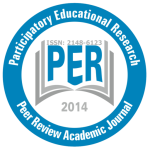The practice of peer review is to ensure that good science is published. It is a collegial process at the heart of good scholarly publishing and is carried out on all reputable scientific journals. Our referees therefore play a vital role in maintaining the high standards of PER and all manuscripts are peer reviewed following the procedure outlined below.
The similarity rates of the manuscripts to be uploaded to the system must be 15% or lower. Studies that have similarities over this ratio will not be evaluated. Authors should also load similarity reports when uploading their manuscripts to the system.
The Editor In Chief, Editors or Assistant Editors first evaluate all manuscripts. Those rejected at this stage are insufficiently original, have serious scientific flaws, have poor grammar or English language, or are outside the aims and scope of the journal. Those that meet the minimum criteria are passed on to at least 2 experts for review. Authors of manuscripts rejected at this stage will be informed within 2 weeks of receipt.
This journal employs double blind reviewing, where both the referee and author remain anonymous throughout the process. Referees are matched to the paper according to their expertise. We welcome suggestions for referees from the author though these recommendations may or may not be used. Referees are asked to evaluate whether the manuscript:
– Is original
– Is methodologically sound
– Follows appropriate ethical guidelines
– Has results which are clearly presented and support the conclusions
– Correctly references previous relevant work.
Typically the manuscript will be reviewed within 2 months. Should the referees’ reports contradict one another or a report is unnecessarily delayed a further expert opinion will be sought. Referees may request more than one revision of a manuscript. A final decision to accept or reject the manuscript will be sent to the author along with any recommendations made by the referees, and may include verbatim comments by the referees. Referees advise the Editors, who are responsible for the final decision to accept or reject the article. When a decision for publication or rejection is made, the first author or author designated to receive correspondence is notified.

